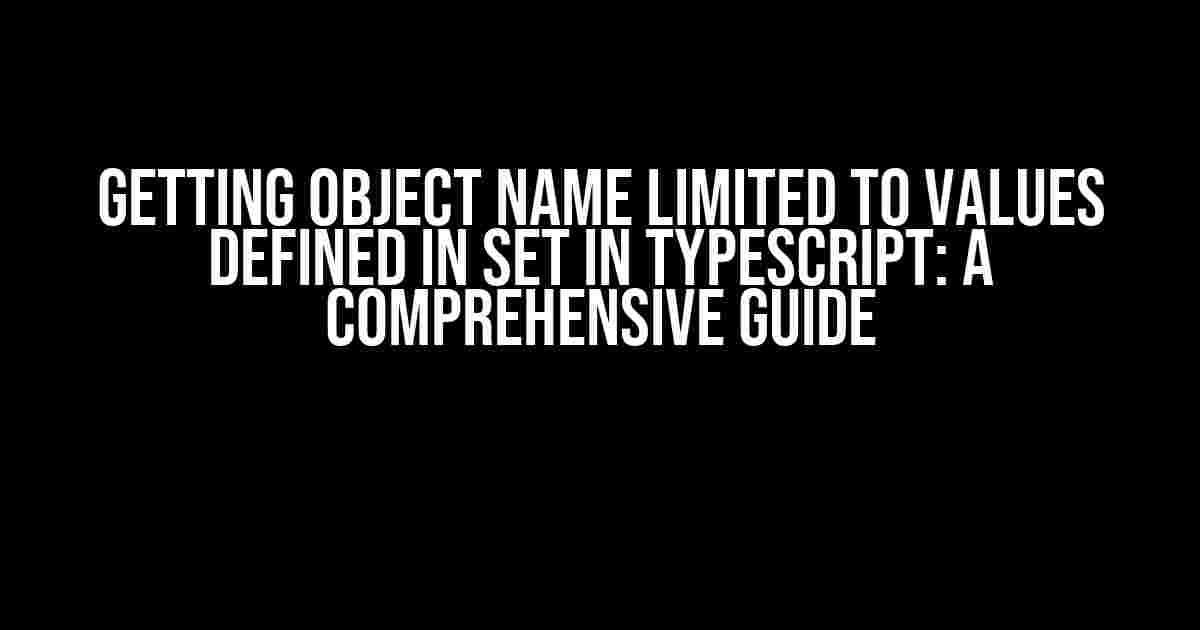Are you tired of dealing with pesky object names that don’t conform to your predetermined set of values? Well, you’re in luck! In this article, we’ll dive into the wonderful world of TypeScript and explore how to get object names limited to values defined in a Set. Buckle up, folks, and let’s get started!
What is a Set in TypeScript?
Before we dive into the nitty-gritty, let’s quickly cover what a Set is in TypeScript. A Set is a collection of unique values, similar to an array, but with the added bonus of automatic removal of duplicates. Think of it like a special snowflake that ensures each value is only present once. You can create a Set using the `new Set()` constructor and add values to it using the `add()` method.
const mySet: Set<string> = new Set();
mySet.add('apple');
mySet.add('banana');
mySet.add('apple'); // Duplicate, won't be added
console.log(mySet); // Output: Set { 'apple', 'banana' }
The Problem: Unrestricted Object Names
Now, imagine you’re working with an object that has a property called `name`, and you want to ensure that `name` can only take on values defined in a specific Set. Without proper constraints, the `name` property can be assigned any value, which can lead to errors and inconsistencies down the line.
interface MyObject {
name: string;
}
const obj: MyObject = { name: 'pear' }; // 🤔 Why 'pear' and not 'apple' or 'banana'?
Limiting Object Names with Enums
One approach to restrict the `name` property is to use an enum. Enums are a way to define a set of named values, and we can use them to create a limited set of possible values for our `name` property.
enum Fruit {
Apple,
Banana,
Orange
}
interface MyObject {
name: Fruit;
}
const obj: MyObject = { name: Fruit.Apple }; // 👍
const obj2: MyObject = { name: 'Grape' }; // 🚫 Error: Type '"Grape"' is not assignable to type 'Fruit'.
Limiting Object Names with String Literal Types
Another way to restrict the `name` property is to use string literal types. We can create a type that represents a union of specific string values, effectively limiting the possible values for our `name` property.
type FruitName = 'Apple' | 'Banana' | 'Orange';
interface MyObject {
name: FruitName;
}
const obj: MyObject = { name: 'Apple' }; // 👍
const obj2: MyObject = { name: 'Grape' }; // 🚫 Error: Type '"Grape"' is not assignable to type 'FruitName'.
Limiting Object Names with a Set
Now, let’s get to the meat of the matter – using a Set to limit the `name` property. We can create a Set of allowed values and use it to constrain the `name` property.
const fruitSet: Set<string> = new Set(['Apple', 'Banana', 'Orange']);
type FruitName = typeof fruitSet extends Set<infer U> ? U : never;
interface MyObject {
name: FruitName;
}
const obj: MyObject = { name: 'Apple' }; // 👍
const obj2: MyObject = { name: 'Grape' }; // 🚫 Error: Type '"Grape"' is not assignable to type 'FruitName'.
In this example, we create a Set of allowed fruit names and use it to create a type `FruitName` that represents the union of those values. We then use this type to constrain the `name` property of our `MyObject` interface.
Benefits of Using a Set
So, why use a Set to limit object names? Here are some benefits:
- Dynamic values**: With a Set, you can dynamically add or remove values, and the type will automatically update.
- Type safety**: Using a Set ensures that the `name` property can only take on values defined in the Set, preventing errors and inconsistencies.
- Readability**: The code is more readable, as the allowed values are explicitly defined in a single place.
Conclusion
In this article, we explored three approaches to limiting object names to values defined in a Set in TypeScript: using enums, string literal types, and a Set. Each approach has its benefits, but using a Set provides the most flexibility and type safety. By leveraging the power of Sets, you can write more robust and maintainable code that’s less prone to errors.
| Approach | Benefits | Use Cases |
|---|---|---|
| Enums | Explicitly defines a set of named values | When the set of values is fixed and small |
| String Literal Types | Creates a type from a union of string values | When the set of values is fixed, but larger than an enum |
| Sets | Dynamic, flexible, and type-safe | When the set of values is dynamic or large |
Which approach will you choose? 🔥 Let us know in the comments! 👇
- Enums: When simplicity and explicitness matter
- String Literal Types: When the set of values is fixed, but larger than an enum
- Sets: When dynamic flexibility and type safety are key
Frequently Asked Question
Get ready to dive into the world of TypeScript and unleash the power of getting object names limited to values defined in a set!
How do I restrict an object property to only accept values from a predefined set in TypeScript?
You can achieve this by using the `as const` assertion and a type alias. For example: `type MySet = ‘value1’ | ‘value2’ | ‘value3’; let myObject: { prop: MySet } = { prop: ‘value1’ }`. This way, when you try to assign a value to `myObject.prop`, TypeScript will only allow values from the `MySet` union type.
What if I have a large set of values and I don’t want to write them all out manually?
No worries! You can use a constant array and the `as const` assertion to create a type from the array values. For example: `const MyValues = [‘value1’, ‘value2’, ‘value3’] as const; type MySet = typeof MyValues[number]; let myObject: { prop: MySet } = { prop: ‘value1’ }`. This way, you can easily manage and update your set of values without having to modify the type definition.
Can I use an enum instead of a union type or constant array?
Yes, you can! Enums can be a great way to define a set of values and use them as a type. For example: `enum MyEnum { Value1, Value2, Value3 }; let myObject: { prop: MyEnum } = { prop: MyEnum.Value1 }`. However, keep in mind that enums have some limitations and might not be suitable for all use cases.
What if I want to restrict an object property to a set of values, but also allow null or undefined?
You can use the `| null | undefined` syntax to add null and undefined to the union type. For example: `type MySet = ‘value1’ | ‘value2’ | ‘value3’ | null | undefined; let myObject: { prop: MySet } = { prop: ‘value1’ }`. This way, `myObject.prop` can be any of the values in the set, or null, or undefined.
How do I get IntelliSense to work with my restricted object property?
To get IntelliSense working, make sure you have the `noImplicitAny` compiler option enabled and that you’re using a compatible version of TypeScript. Also, ensure that your object property is properly typed and that you’re using the correct type annotation. With these settings in place, you should see IntelliSense suggestions and error checking working as expected.



